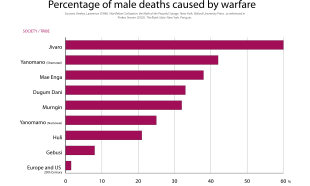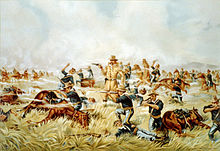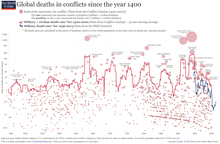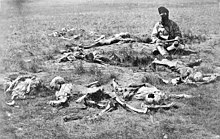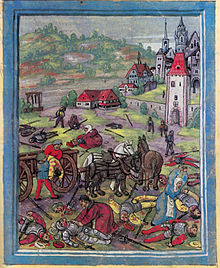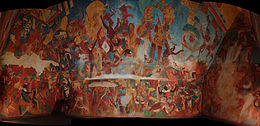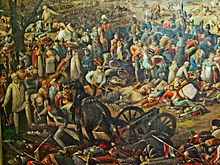| Clockwise from top left: Ancient warfare: Stele of the Vultures, c 2500 BC. Medieval warfare: Battle of Hastings, 1066. Early modern warfare: Retreat from Moscow, 1812. Industrial age warfare: Battle of the Somme, 1916. Modern warfare: Into the Jaws of Death, 1944. Nuclear warfare: Nuclear weapon test, 1954. |
War is intense armed conflict between states, governments, societies, or paramilitary groups such as mercenaries, insurgents and militias. It is generally characterized by extreme violence, aggression, destruction, and mortality, using regular or irregular military forces. Warfare refers to the common activities and characteristics of types of war, or of wars in general. Total war is warfare that is not restricted to purely legitimate military targets, and can result in massive civilian or other non-combatant suffering and casualties.
The scholarly study of war is sometimes called polemology (/ˌpɒləˈmɒlədʒi/ POL-ə-MOL-ə-jee), from the Greek polemos, meaning "war", and -logy, meaning "the study of".
While some scholars see war as a universal and ancestral aspect of human nature, others argue it is a result of specific socio-cultural, economic or ecological circumstances.
Etymology
Mural of War (1896), by Gari Melchers
The English word war derives from the 11th-century Old English words wyrre and werre, from Old French werre (also guerre as in modern French), in turn from the Frankish *werra, ultimately deriving from the Proto-Germanic *werzō 'mixture, confusion'. The word is related to the Old Saxon werran, Old High German werran, and the German verwirren, meaning “to confuse”, “to perplex”, and “to bring into confusion”.
Types of warfare
- Asymmetric warfare is a conflict between belligerents of drastically different levels of military capability or size.
- Biological warfare, or germ warfare, is the use of weaponized biological toxins or infectious agents such as bacteria, viruses, and fungi.
- Chemical warfare involves the use of weaponized chemicals in combat. Poison gas as a chemical weapon was principally used during World War I, and resulted in over a million estimated casualties, including more than 100,000 civilians.
- Cold warfare is an intense international rivalry without direct military conflict, but with a sustained threat of it, including high levels of military preparations, expenditures, and development, and may involve active conflicts by indirect means, such as economic warfare, political warfare, covert operations, espionage, cyberwarfare, or proxy wars.
- Conventional warfare is declared war between states in which nuclear, biological, or chemical weapons are not used or see limited deployment.
- Cyberwarfare involves the actions by a nation-state or international organization to attack and attempt to damage another nation's information systems.
- Insurgency is a rebellion against authority, when those taking part in the rebellion are not recognized as belligerents (lawful combatants). An insurgency can be fought via counter-insurgency warfare, and may also be opposed by measures to protect the population, and by political and economic actions of various kinds aimed at undermining the insurgents' claims against the incumbent regime.
- Information warfare is the application of destructive force on a large scale against information assets and systems, against the computers and networks that support the four critical infrastructures (the power grid, communications, financial, and transportation).
- Nuclear warfare is warfare in which nuclear weapons are the primary, or a major, method of achieving capitulation.
- Total war is warfare by any means possible, disregarding the laws of war, placing no limits on legitimate military targets, using weapons and tactics resulting in significant civilian casualties, or demanding a war effort requiring significant sacrifices by the friendly civilian population.
- Unconventional warfare, the opposite of conventional warfare, is an attempt to achieve military victory through acquiescence, capitulation, or clandestine support for one side of an existing conflict.
History
The
percentages of men killed in war in eight tribal societies, and Europe
and the U.S. in the 20th century. (Lawrence H. Keeley, archeologist)
The earliest evidence for prehistoric warfare belongs to the Mesolithic cemetery Site 117,
which has been determined to be approximately 14,000 years old. About
forty-five percent of the skeletons there displayed signs of violent
death. Since the rise of the state some 5,000 years ago, military activity has occurred over much of the globe. The advent of gunpowder
and the acceleration of technological advances led to modern warfare.
According to Conway W. Henderson, "One source claims that 14,500 wars
have taken place between 3500 BC and the late 20th century, costing 3.5
billion lives, leaving only 300 years of peace (Beer 1981: 20)." An unfavorable review of this estimate
mentions the following regarding one of the proponents of this
estimate: "In addition, perhaps feeling that the war casualties figure
was improbably high, he changed "approximately 3,640,000,000 human
beings have been killed by war or the diseases produced by war" to
"approximately 1,240,000,000 human beings...&c."" The lower figure
is more plausible,
but could also be on the high side, considering that the 100 deadliest
acts of mass violence between 480 BC and 2002 AD (wars and other
man-made disasters with at least 300,000 and up to 66 million victims)
claimed about 455 million human lives in total. Primitive warfare is estimated to have accounted for 15.1 % of deaths and claimed 400 million victims.
Added to the aforementioned (and perhaps too high) figure of 1,240
million between 3500 BC and the late 20th century, this would mean a
total of 1,640,000,000 people killed by war (including deaths from
famine and disease caused by war) throughout the history and pre-history
of mankind. For comparison, an estimated 1,680,000,000 people died from
infectious diseases in the 20th century. Nuclear warfare
breaking out in August 1988, when nuclear arsenals were at peak level,
and the aftermath thereof, could have reduced human population from
5,150,000,000 by 1,850,000,000 to 3,300,000,000 within a period of about
one year, according to a projection that did not consider "the most
severe predictions concerning nuclear winter".
This would have been a proportional reduction of the world's population
exceeding the reduction caused in the 14th century by the Black Death, and comparable in proportional terms with the plague's impact on Europe's population in 1346–53.
In War Before Civilization, Lawrence H. Keeley, a professor at the University of Illinois, says approximately 90–95% of known societies throughout history engaged in at least occasional warfare, and many fought constantly.
Keeley describes several styles of primitive combat such as small
raids, large raids, and massacres. All of these forms of warfare were
used by primitive societies, a finding supported by other researchers.
Keeley explains that early war raids were not well organized, as the
participants did not have any formal training. Scarcity of resources
meant defensive works were not a cost-effective way to protect the
society against enemy raids.
William Rubinstein
wrote "Pre-literate societies, even those organised in a relatively
advanced way, were renowned for their studied cruelty...'archaeology
yields evidence of prehistoric massacres more severe than any recounted
in ethnography [i.e., after the coming of the Europeans].'"
In Western Europe, since the late 18th century, more than 150 conflicts and about 600 battles have taken place.
During the 20th century, war resulted in a dramatic intensification of
the pace of social changes, and was a crucial catalyst for the emergence
of the Left as a force to be reckoned with.
According to the U.S. Bureau of the Census (1894), the Indian Wars of the 19th century cost the lives of about 50,000.
In 1947, in view of the rapidly increasingly destructive consequences
of modern warfare, and with a particular concern for the consequences
and costs of the newly developed atom bomb, Albert Einstein
famously stated, "I know not with what weapons World War III will be
fought, but World War IV will be fought with sticks and stones."
Mao Zedong
urged the socialist camp not to fear nuclear war with the United States
since, even if "half of mankind died, the other half would remain while
imperialism would be razed to the ground and the whole world would
become socialist."
A distinctive feature since 1945 is the absence of wars between
major powers—indeed the near absence of any traditional wars between
established countries. The major exceptions were the Indo-Pakistani War of 1971, the Iran–Iraq War 1980–1988, and the Gulf War of 1990–91. Instead actual fighting has largely been a matter of civil wars and insurgencies.
The Human Security Report 2005 documented a significant decline in the number and severity of armed conflicts since the end of the Cold War
in the early 1990s. However, the evidence examined in the 2008 edition
of the Center for International Development and Conflict Management's
"Peace and Conflict" study indicated the overall decline in conflicts
had stalled.
Effects
Global deaths in conflicts since the year 1400.
Military and civilian casualties in recent human history
Disability-adjusted life year for war per 100,000 inhabitants in 2004
no data
less than 100
100–200
200–600
600–1000
1000–1400
1400–1800
1800–2200
2200–2600
2600–3000
3000–8000
8000–8800
more than 8800
Throughout the course of human history, the average number of people
dying from war has fluctuated relatively little, being about 1 to 10
people dying per 100,000. However, major wars over shorter periods have
resulted in much higher casualty rates, with 100-200 casualties per
100,000 over a few years. While conventional wisdom holds that
casualties have increased in recent times due to technological
improvements in warfare, this is not generally true. For instance, the Thirty Years' War (1618-1648) had about the same number of casualties per capita as World War I, although it was higher during World War II
(WWII). That said, overall the number of casualties from war has not
significantly increased in recent times. Quite to the contrary, on a
global scale the time since WWII has been unusually peaceful.
Largest by death toll
The deadliest war in history, in terms of the cumulative number of deaths since its start, is World War II, from 1939 to 1945, with 60–85 million deaths, followed by the Mongol conquests at up to 60 million. As concerns a belligerent's losses in proportion to its prewar population, the most destructive war in modern history may have been the Paraguayan War. In 2013 war resulted in 31,000 deaths, down from 72,000 deaths in 1990. In 2003, Richard Smalley identified war as the sixth biggest problem (out of ten) facing humanity for the next fifty years. War usually results in significant deterioration of infrastructure and the ecosystem, a decrease in social spending, famine, large-scale emigration from the war zone, and often the mistreatment of prisoners of war or civilians. For instance, of the nine million people who were on the territory of the Byelorussian SSR
in 1941, some 1.6 million were killed by the Germans in actions away
from battlefields, including about 700,000 prisoners of war, 500,000
Jews, and 320,000 people counted as partisans (the vast majority of whom
were unarmed civilians). Another byproduct of some wars is the prevalence of propaganda by some or all parties in the conflict, and increased revenues by weapons manufacturers.
Three of the ten most costly wars, in terms of loss of life, have
been waged in the last century. These are the two World Wars, followed
by the Second Sino-Japanese War (which is sometimes considered part of World War II,
or as overlapping). Most of the others involved China or neighboring
peoples. The death toll of World War II, being over 60 million,
surpasses all other war-death-tolls.
| Deaths (millions) |
Date | War |
|---|---|---|
| 60.7–84.6 | 1939–1945 | World War II |
| 60 | 13th century | Mongol Conquests |
| 40 | 1850–1864 | Taiping Rebellion |
| 39 | 1914–1918 | World War I |
| 36 | 755–763 | An Lushan Rebellion (death toll uncertain) |
| 25 | 1616–1662 | Qing dynasty conquest of Ming dynasty |
| 20 | 1937–1945 | Second Sino-Japanese War |
| 20 | 1370–1405 | Conquests of Tamerlane |
| 16 | 1862–1877 | Dungan revolt |
| 5–9 | 1917–1922 | Russian Civil War and Foreign Intervention |
On military personnel
Military personnel subject to combat in war often suffer mental and physical injuries, including depression, posttraumatic stress disorder, disease, injury, and death.
In every war in which American soldiers have fought in, the chances of becoming a psychiatric casualty – of being debilitated for some period of time as a consequence of the stresses of military life – were greater than the chances of being killed by enemy fire.
— No More Heroes, Richard Gabriel
During World War II, research conducted by US Army Brigadier General S.L.A. Marshall found, on average, 15% to 20% of American riflemen in WWII combat fired at the enemy.
In Civil War Collector's Encyclopedia, F.A. Lord notes that of the
27,574 discarded muskets found on the Gettysburg battlefield, nearly 90%
were loaded, with 12,000 loaded more than once and 6,000 loaded 3 to 10
times. These studies suggest most military personnel resist firing
their weapons in combat, that – as some theorists argue – human beings
have an inherent resistance to killing their fellow human beings.
Swank and Marchand's WWII study found that after sixty days of
continuous combat, 98% of all surviving military personnel will become
psychiatric casualties. Psychiatric casualties manifest themselves in
fatigue cases, confusional states, conversion hysteria, anxiety,
obsessional and compulsive states, and character disorders.
One-tenth of mobilised American men were hospitalised for mental disturbances between 1942 and 1945, and after thirty-five days of uninterrupted combat, 98% of them manifested psychiatric disturbances in varying degrees.
— 14–18: Understanding the Great War, Stéphane Audoin-Rouzeau, Annette Becker
The Apotheosis of War (1871) by Vasily Vereshchagin
Additionally, it has been estimated anywhere from 18% to 54% of Vietnam war veterans suffered from posttraumatic stress disorder.
Based on 1860 census figures, 8% of all white American males aged 13 to 43 died in the American Civil War, including about 6% in the North and approximately 18% in the South. The war remains the deadliest conflict in American history, resulting in the deaths of 620,000 military personnel. United States military casualties of war since 1775 have totaled over two million. Of the 60 million European military personnel who were mobilized in World War I, 8 million were killed, 7 million were permanently disabled, and 15 million were seriously injured.
The remains of dead Crow Indians killed and scalped by Sioux c. 1874
During Napoleon's retreat from Moscow, more French military personnel died of typhus than were killed by the Russians. Of the 450,000 soldiers who crossed the Neman
on 25 June 1812, less than 40,000 returned. More military personnel
were killed from 1500–1914 by typhus than from military action.
In addition, if it were not for modern medical advances there would be
thousands more dead from disease and infection. For instance, during the
Seven Years' War, the Royal Navy reported it conscripted 184,899 sailors, of whom 133,708 (72%) died of disease or were 'missing'.
It is estimated that between 1985 and 1994, 378,000 people per year died due to war.
On civilians
Les Grandes Misères de la guerre depict the destruction unleashed on civilians during the Thirty Years' War.
Most wars have resulted in significant loss of life, along with destruction of infrastructure and resources (which may lead to famine, disease, and death in the civilian population). During the Thirty Years' War in Europe, the population of the Holy Roman Empire was reduced by 15 to 40 percent. Civilians in war zones may also be subject to war atrocities such as genocide, while survivors may suffer the psychological aftereffects of witnessing the destruction of war.
Most estimates of World War II casualties indicate around 60 million people died, 40 million of which were civilians. Deaths in the Soviet Union were around 27 million.
Since a high proportion of those killed were young men who had not yet
fathered any children, population growth in the postwar Soviet Union was
much lower than it otherwise would have been.
Economic
Once a war has ended, losing nations are sometimes required to pay war reparations to the victorious nations. In certain cases, land is ceded to the victorious nations. For example, the territory of Alsace-Lorraine has been traded between France and Germany on three different occasions.
Typically, war becomes intertwined with the economy and many wars
are partially or entirely based on economic reasons. Some economists
believe war can stimulate a country's economy (high government spending
for World War II is often credited with bringing the U.S. out of the Great Depression by most Keynesian economists), but in many cases, such as the wars of Louis XIV, the Franco-Prussian War, and World War I,
warfare primarily results in damage to the economy of the countries
involved. For example, Russia's involvement in World War I took such a
toll on the Russian economy that it almost collapsed and greatly
contributed to the start of the Russian Revolution of 1917.
World War II
Ruins of Warsaw's Napoleon Square in the aftermath of World War II
World War II was the most financially costly conflict in history; its belligerents cumulatively spent about a trillion U.S. dollars on the war effort (as adjusted to 1940 prices).
The Great Depression of the 1930s ended as nations increased their production of war materials.
By the end of the war, 70% of European industrial infrastructure was destroyed. Property damage in the Soviet Union inflicted by the Axis invasion
was estimated at a value of 679 billion rubles. The combined damage
consisted of complete or partial destruction of 1,710 cities and towns,
70,000 villages/hamlets, 2,508 church buildings, 31,850 industrial
establishments, 40,000 mi (64,374 km) of railroad, 4100 railroad
stations, 40,000 hospitals, 84,000 schools, and 43,000 public libraries.
Artistic
War leads to forced migration
causing potentially large displacements of population. Among forced
migrants there are usually relatively large shares of artists and other
types of creative people, causing so the war effects to be particularly
harmful for the country's creative potential in the long-run. War also has a negative effect on an artists’ individual life-cycle output.
In war, cultural institutions, such as libraries, can become
"targets in themselves; their elimination was a way to denigrate and
demoralize the enemy population." The impact such destruction can have
on a society is important because "in an era in which competing
ideologies fuel internal and international conflict, the destruction of
libraries and other items of cultural significance is neither random nor
irrelevant. Preserving the world’s repositories of knowledge is crucial
to ensuring that the darkest moments of history do not endlessly repeat
themselves."
Aims
Entities deliberately contemplating going to war and entities considering whether to end a war may formulate war aims as an evaluation/propaganda tool. War aims may stand as a proxy for national-military resolve.
Definition
Fried defines war aims as "the desired territorial, economic,
military or other benefits expected following successful conclusion of a
war".
Classification
Tangible/intangible aims:
- Tangible war aims may involve (for example) the acquisition of territory (as in the German goal of Lebensraum in the first half of the 20th century) or the recognition of economic concessions (as in the Anglo-Dutch Wars).
- Intangible war aims – like the accumulation of credibility or reputation – may have more tangible expression ("conquest restores prestige, annexation increases power").
Explicit/implicit aims:
- Explicit war aims may involve published policy decisions.
- Implicit war aims can take the form of minutes of discussion, memoranda and instructions.
Positive/negative aims:
- "Positive war aims" cover tangible outcomes.
- "Negative war aims" forestall or prevent undesired outcomes.
War aims can change in the course of conflict and may eventually morph into "peace conditions" – the minimal conditions under which a state may cease to wage a particular war.
Limiting and stopping
Anti-war rally in Washington, D.C., March 15, 2003
Religious groups have long formally opposed or sought to limit war as in the Second Vatican Council document Gaudiem et Spes:
"Any act of war aimed indiscriminately at the destruction of entire
cities of extensive areas along with their population is a crime against
God and man himself. It merits unequivocal and unhesitating
condemnation."
Anti-war movements have existed for every major war in the 20th century, including, most prominently, World War I, World War II, and the Vietnam War. In the 21st century, worldwide anti-war movements occurred in response to the United States invasion of Afghanistan and Iraq. Protests opposing the War in Afghanistan occurred in Europe, Asia, and the United States. Organizations like Stop the War Coalition, based in the United Kingdom, worked on campaigning against the war.
The Mexican Drug War, with estimated casualties of 40,000 since December 2006, has recently faced fundamental opposition.
In 2011, the movement for peace and justice has started a popular
middle-class movement against the war. It won the recognition of
President Calderon, who began the war.
Theories of motivation
The Ottoman campaign for territorial expansion in Europe in 1566
There are many theories about the motivations for war, but no consensus about which are most common. Carl von Clausewitz said, 'Every age has its own kind of war, its own limiting conditions, and its own peculiar preconceptions.'
Psychoanalytic
Dutch psychoanalyst Joost Meerloo
held that, "War is often...a mass discharge of accumulated internal
rage (where)...the inner fears of mankind are discharged in mass
destruction."
Other psychoanalysts such as E.F.M. Durban and John Bowlby have argued human beings are inherently violent. This aggressiveness is fueled by displacement and projection where a person transfers his or her grievances into bias and hatred against other races, religions, nations or ideologies. By this theory, the nation state preserves order in the local society while creating an outlet for aggression through warfare.
The Italian psychoanalyst Franco Fornari, a follower of Melanie Klein, thought war was the paranoid or projective “elaboration” of mourning.
Fornari thought war and violence develop out of our “love need”: our
wish to preserve and defend the sacred object to which we are attached,
namely our early mother and our fusion with her. For the adult, nations
are the sacred objects that generate warfare. Fornari focused upon
sacrifice as the essence of war: the astonishing willingness of human
beings to die for their country, to give over their bodies to their
nation.
Despite Fornari's theory that man's altruistic desire for
self-sacrifice for a noble cause is a contributing factor towards war,
few wars have originated from a desire for war among the general
populace.
Far more often the general population has been reluctantly drawn into
war by its rulers. One psychological theory that looks at the leaders is
advanced by Maurice Walsh.
He argues the general populace is more neutral towards war and wars
occur when leaders with a psychologically abnormal disregard for human
life are placed into power. War is caused by leaders who seek war such
as Napoleon and Hitler.
Such leaders most often come to power in times of crisis when the
populace opts for a decisive leader, who then leads the nation to war.
Naturally, the common people don't want war; neither in Russia nor in England nor in America, nor for that matter in Germany. That is understood. But, after all, it is the leaders of the country who determine the policy and it is always a simple matter to drag the people along, whether it is a democracy or a fascist dictatorship or a Parliament or a Communist dictatorship. ... the people can always be brought to the bidding of the leaders. That is easy. All you have to do is tell them they are being attacked and denounce the pacifists for lack of patriotism and exposing the country to danger. It works the same way in any country.
— Hermann Göring at the Nuremberg trials, April 18, 1946
Evolutionary
Women and priests retrieve the dead bodies of Swabian soldiers just outside the city gates of Constance after the battle of Schwaderloh. (Luzerner Schilling)
Several theories concern the evolutionary origins of warfare. There
are two main schools: One sees organized warfare as emerging in or after
the Mesolithic as a result of complex social organization and greater
population density and competition
over resources; the other sees human warfare as a more ancient practice
derived from common animal tendencies, such as territoriality and
sexual competition.
The latter school argues that since warlike behavior patterns are found in many primate species such as chimpanzees, as well as in many ant species,
group conflict may be a general feature of animal social behavior. Some
proponents of the idea argue that war, while innate, has been
intensified greatly by developments of technology and social
organization such as weaponry and states.
Psychologist and linguist Steven Pinker argued that war-related behaviors may have been naturally selected in the ancestral environment due to the benefits of victory. He also argued that in order to have credible deterrence
against other groups (as well as on an individual level), it was
important to have a reputation for retaliation, causing humans to
develop instincts for revenge as well as for protecting a group's (or an individual's) reputation ("honor").
Increasing population and constant warfare among the Maya city-states over resources may have contributed to the eventual collapse of the Maya civilization by AD 900.
Crofoot and Wrangham have argued that warfare, if defined as group
interactions in which "coalitions attempt to aggressively dominate or
kill members of other groups", is a characteristic of most human
societies. Those in which it has been lacking "tend to be societies that
were politically dominated by their neighbors".
Ashley Montagu
strongly denied universalistic instinctual arguments, arguing that
social factors and childhood socialization are important in determining
the nature and presence of warfare. Thus, he argues, warfare is not a
universal human occurrence and appears to have been a historical
invention, associated with certain types of human societies.
Montagu's argument is supported by ethnographic research conducted in
societies where the concept of aggression seems to be entirely absent,
e.g. the Chewong and Semai of the Malay peninsula.
Bobbi S. Low has observed correlation between warfare and education,
noting societies where warfare is commonplace encourage their children
to be more aggressive.
Economic
War can be seen as a growth of economic competition in a competitive
international system. In this view wars begin as a pursuit of markets
for natural resources and for wealth. War has also been linked to economic development by economic historians and development economists studying state-building and fiscal capacity.
While this theory has been applied to many conflicts, such counter
arguments become less valid as the increasing mobility of capital and
information level the distributions of wealth worldwide, or when
considering that it is relative, not absolute, wealth differences that
may fuel wars. There are those on the extreme right
of the political spectrum who provide support, fascists in particular,
by asserting a natural right of a strong nation to whatever the weak
cannot hold by force. Some centrist, capitalist, world leaders, including Presidents of the United States and U.S. Generals, expressed support for an economic view of war.
Marxist
The Marxist
theory of war is quasi-economic in that it states all modern wars are
caused by competition for resources and markets between great (imperialist) powers, claiming these wars are a natural result of the free market and class system. Part of the theory is that war will disappear once a world revolution, over-throwing free markets and class systems, has occurred. Marxist philosopher Rosa Luxemburg theorized that imperialism was the result of capitalist countries needing new markets. Expansion of the means of production is only possible if there is a corresponding growth in consumer demand. Since the workers in a capitalist economy
would be unable to fill the demand, producers must expand into
non-capitalist markets to find consumers for their goods, hence driving
imperialism.
Demographic
Demographic theories can be grouped into two classes, Malthusian and youth bulge theories:
Malthusian
U.S. Marine helicopter on patrol in Somalia as part of the Unified Task Force, 1992
Malthusian theories see expanding population and scarce resources as a source of violent conflict.
Pope Urban II in 1095, on the eve of the First Crusade, advocating Crusade as a solution to European overpopulation, said:
For this land which you now inhabit, shut in on all sides by the sea and the mountain peaks, is too narrow for your large population; it scarcely furnishes food enough for its cultivators. Hence it is that you murder and devour one another, that you wage wars, and that many among you perish in civil strife. Let hatred, therefore, depart from among you; let your quarrels end. Enter upon the road to the Holy Sepulchre; wrest that land from a wicked race, and subject it to yourselves.
This is one of the earliest expressions of what has come to be called
the Malthusian theory of war, in which wars are caused by expanding
populations and limited resources. Thomas Malthus (1766–1834) wrote that populations always increase until they are limited by war, disease, or famine.
The violent herder–farmer conflicts in Nigeria, Mali, Sudan and other countries in the Sahel region have been exacerbated by land degradation and population growth.
Youth bulge
Median age by country. War reduces life expectancy. A youth bulge is evident for Africa, and to a lesser extent in some countries in West Asia, South Asia, Southeast Asia and Central America.
According to Heinsohn, who proposed youth bulge
theory in its most generalized form, a youth bulge occurs when 30 to 40
percent of the males of a nation belong to the "fighting age" cohorts
from 15 to 29 years of age. It will follow periods with total fertility rates as high as 4–8 children per woman with a 15–29-year delay.
Heinsohn saw both past "Christianist" European colonialism and
imperialism, as well as today's Islamist civil unrest and terrorism as
results of high birth rates producing youth bulges.
Among prominent historical events that have been attributed to youth
bulges are the role played by the historically large youth cohorts in
the rebellion and revolution waves of early modern Europe, including the
French Revolution of 1789, and the effect of economic depression upon the largest German youth cohorts ever in explaining the rise of Nazism in Germany in the 1930s. The 1994 Rwandan genocide has also been analyzed as following a massive youth bulge.
Youth bulge theory has been subjected to statistical analysis by the World Bank, Population Action International, and the Berlin Institute for Population and Development. Youth bulge theories have been criticized as leading to racial, gender and age discrimination.
Rationalist
U.S. soldiers directing artillery on enemy trucks in A Shau Valley, April 1968
Rationalism is an international relations theory or framework. Rationalism (and Neorealism (international relations))
operate under the assumption that states or international actors are
rational, seek the best possible outcomes for themselves, and desire to
avoid the costs of war. Under one game theory
approach, rationalist theories posit all actors can bargain, would be
better off if war did not occur, and likewise seek to understand why war
nonetheless reoccurs. Under another rationalist game theory without
bargaining, the peace war game, optimal strategies can still be found that depend upon number of iterations played. In "Rationalist Explanations for War", James Fearon examined three rationalist explanations for why some countries engage in war:
- Issue indivisibilities
- Incentives to misrepresent or information asymmetry
- Commitment problems
"Issue indivisibility" occurs when the two parties cannot avoid war
by bargaining, because the thing over which they are fighting cannot be
shared between them, but only owned entirely by one side or the other.
U.S. Marines direct a concentration of fire at the enemy, Vietnam, 8 May 1968
"Information asymmetry
with incentives to misrepresent" occurs when two countries have secrets
about their individual capabilities, and do not agree on either: who
would win a war between them, or the magnitude of state's victory or
loss. For instance, Geoffrey Blainey
argues that war is a result of miscalculation of strength. He cites
historical examples of war and demonstrates, "war is usually the outcome
of a diplomatic crisis which cannot be solved because both sides have
conflicting estimates of their bargaining power." Thirdly, bargaining may fail due to the states' inability to make credible commitments.
Within the rationalist tradition, some theorists have suggested that individuals engaged in war suffer a normal level of cognitive bias, but are still "as rational as you and me". According to philosopher Iain King,
"Most instigators of conflict overrate their chances of success, while
most participants underrate their chances of injury...." King asserts that "Most catastrophic military decisions are rooted in GroupThink" which is faulty, but still rational.
The rationalist theory focused around bargaining is currently
under debate. The Iraq War proved to be an anomaly that undercuts the
validity of applying rationalist theory to some wars.
Political science
The statistical analysis of war was pioneered by Lewis Fry Richardson following World War I. More recent databases of wars and armed conflict have been assembled by the Correlates of War Project, Peter Brecke and the Uppsala Conflict Data Program.
The following subsections consider causes of war from system,
societal, and individual levels of analysis. This kind of division was
first proposed by Kenneth Waltz in Man, the State, and War and has been often used by political scientists since then.
System-level
There are several different international relations theory schools. Supporters of realism in international relations
argue that the motivation of states is the quest for security, and
conflicts can arise from the inability to distinguish defense from
offense, which is called the security dilemma.
Within the realist school as represented by scholars such as Henry Kissinger and Hans Morgenthau, and the neorealist school represented by scholars such as Kenneth Waltz and John Mearsheimer, two main sub-theories are:
- Balance of power theory: States have the goal of preventing a single state from becoming a hegemon, and war is the result of the would-be hegemon's persistent attempts at power acquisition. In this view, an international system with more equal distribution of power is more stable, and "movements toward unipolarity are destabilizing." However, evidence has shown power polarity is not actually a major factor in the occurrence of wars.
- Power transition theory: Hegemons impose stabilizing conditions on the world order, but they eventually decline, and war occurs when a declining hegemon is challenged by another rising power or aims to preemptively suppress them. On this view, unlike for balance-of-power theory, wars become more probable when power is more equally distributed. This "power preponderance" hypothesis has empirical support.
The two theories are not mutually exclusive and may be used to explain disparate events according to the circumstance.
Liberalism
as it relates to international relations emphasizes factors such as
trade, and its role in disincentivizing conflict which will damage
economic relations. Realists
respond that military force may sometimes be at least as effective as
trade at achieving economic benefits, especially historically if not as
much today. Furthermore, trade relations which result in a high level of dependency may escalate tensions and lead to conflict.
Empirical data on the relationship of trade to peace are mixed, and
moreover, some evidence suggests countries at war don't necessarily
trade less with each other.
Societal-level
- Diversionary theory, also known as the "scapegoat hypothesis", suggests the politically powerful may use war to as a diversion or to rally domestic popular support. This is supported by literature showing out-group hostility enhances in-group bonding, and a significant domestic "rally effect" has been demonstrated when conflicts begin. However, studies examining the increased use of force as a function of need for internal political support are more mixed. U.S. war-time presidential popularity surveys taken during the presidencies of several recent U.S. leaders have supported diversionary theory.
Individual-level
These theories suggest differences in people's personalities,
decision-making, emotions, belief systems, and biases are important in
determining whether conflicts get out of hand. For instance, it has been proposed that conflict is modulated by bounded rationality and various cognitive biases, such as prospect theory.
Ethics
Morning after the Battle of Waterloo, by John Heaviside Clark, 1816
The morality of war has been the subject of debate for thousands of years.
The two principal aspects of ethics in war, according to the just war theory, are jus ad bellum and Jus in bello.
Jus ad bellum (right to war), dictates which unfriendly
acts and circumstances justify a proper authority in declaring war on
another nation. There are six main criteria for the declaration of a
just war: first, any just war must be declared by a lawful authority;
second, it must be a just and righteous cause, with sufficient gravity
to merit large-scale violence; third, the just belligerent must have
rightful intentions – namely, that they seek to advance good and curtail
evil; fourth, a just belligerent must have a reasonable chance of
success; fifth, the war must be a last resort; and sixth, the ends being
sought must be proportional to means being used.
Jus in bello
(right in war), is the set of ethical rules when conducting war. The
two main principles are proportionality and discrimination.
Proportionality regards how much force is necessary and morally
appropriate to the ends being sought and the injustice suffered.
The principle of discrimination determines who are the legitimate
targets in a war, and specifically makes a separation between
combatants, who it is permissible to kill, and non-combatants, who it is
not. Failure to follow these rules can result in the loss of legitimacy for the just-war-belligerent.
In besieged Leningrad.
"Hitler ordered that Moscow and Leningrad were to be razed to the
ground; their inhabitants were to be annihilated or driven out by
starvation. These intentions were part of the 'General Plan East'." – The Oxford Companion to World War II.
The just war theory was foundational in the creation of the United Nations and in International Law's regulations on legitimate war.
Fascism, and the ideals it encompasses, such as Pragmatism, racism, and social Darwinism, hold that violence is good.
Pragmatism holds that war and violence can be good if it serves the
ends of the people, without regard for universal morality. Racism holds
that violence is good so that a master race can be established, or to
purge an inferior race from the earth, or both. Social Darwinism asserts
that violence is sometimes necessary to weed the unfit from society so
civilization can flourish. These are broad archetypes for the general position that the ends justify the means.
Lewis Coser, U.S. conflict theorist and sociologist, argued conflict
provides a function and a process whereby a succession of new
equilibriums are created. Thus, the struggle of opposing forces, rather
than being disruptive, may be a means of balancing and maintaining a
social structure or society.







